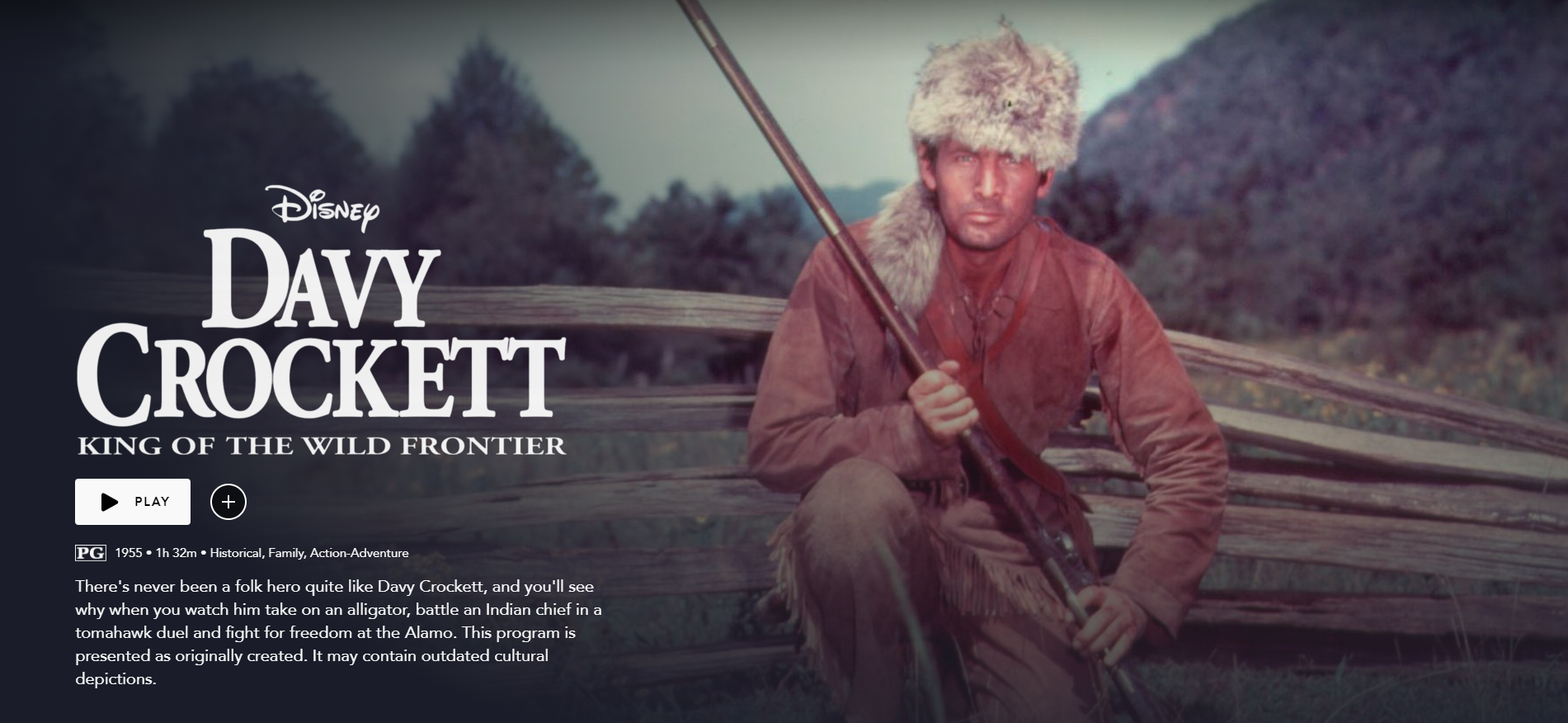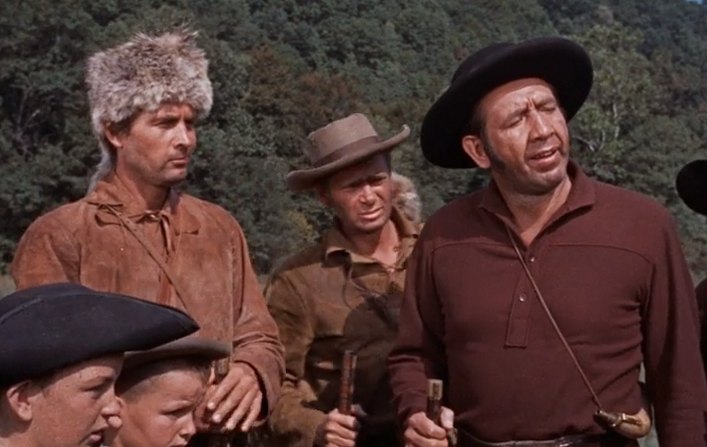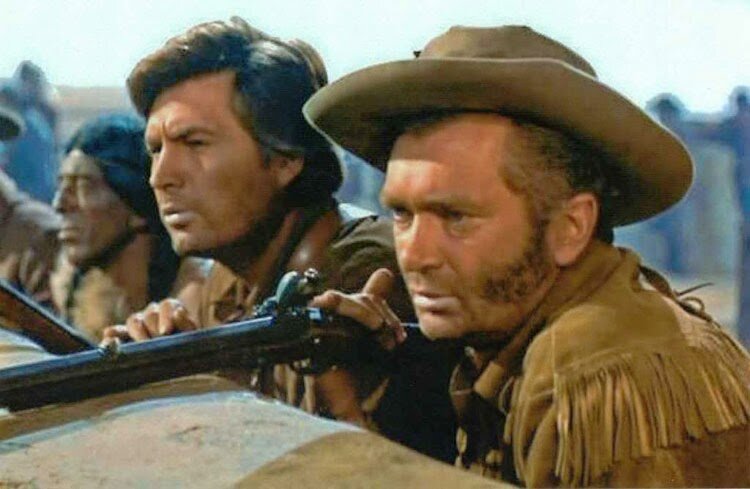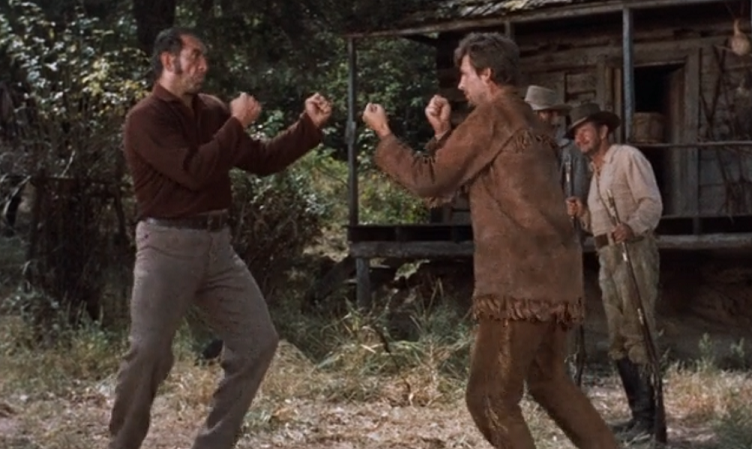Review: Davy Crockett, King of the Wild Frontier (DMC #20)
“Off through the woods [we’re] a marchin' along. Makin' up yarns an' a singin' a song.” Welcome back, everyone! We can’t actually go marching through the woods right now, so instead we continued our challenge by watching Davy Crockett, King of the Wild Frontier, the twentieth movie from our list. Read on for our synopsis if you need a refresher, or skip ahead to the review!
Synopsis
During the Creek War, Major Tobias Norton is sent by General Andrew Jackson to find the scout Davy Crockett, who has volunteered to fight along with his partner and friend George E. Russell. Crockett and Russell are out hunting, where Crockett is trying to “grin down a bear,” though he eventually has to kill it with a knife after the major distracts him. The group returns to General Jackson, who orders Crockett and Russell to take a group and scout ahead towards enemy territory (a tribe of Native Americans) to discover what they’re up to. A short battle ensues, with Crockett and Russell taking out most of the natives. Jackson and the rest of the group travel to the camp, where a larger battle takes place. Crockett is knocked unconscious and nearly killed until Russell saves him. Much of the tribe are rounded up, resulting in a victory. Crockett and Russell defy orders to remain with the force and instead return home to ensure their families will be well off for the upcoming winter. Crockett’s return is short-lived, however, and he and Russell soon return to the war, where things are not going well for Major Norton and his army. Though Norton forbids them from searching for the tribe and their chief, Red Stick, they once more defy him. The two split up on the way, and Russell is captured. Crockett goes to rescue him, challenging Chief Red Stick to a tomahawk battle. He wins the duel, and agrees to spare the chief’s life in exchange for signing the Treaty of Fort Jackson.
Some time later, Crockett and Russell travel west to search for open land to build new homes for their families. Crockett squares off with Bigfoot Mason in a shooting competition to win a settlement claim. He learns that Mason is forcing Native Americans off their land and reselling it. Crockett and Russell befriend a Cherokee named Charlie Two Shirts and his family, all of whom Mason has forced off. Crockett is asked to become a local magistrate. He finds Mason and defeats him in a hand-to-hand brawl, arresting him and his accomplice, while the other is killed by Charlie after attempting to shoot Crockett. Crockett is later asked to run for the Tennessee state legislature against Amos Thorpe, a corrupt politician trying to claim Native American territory. Crockett receives a letter from his sister-in-law informing him that his wife has died of a fever. He eventually decides to run for the legislature, starting off his campaign with a short but honest speech in comparison to Thorpe’s long and empty-worded speech. Crockett easily wins the election. In Washington, D.C., he reunites with Norton and Andrew Jackson, who is now running for President of the United States. Jackson convinces him to run for the U.S. House of Representatives. Crockett expresses some disillusionment with the government and shares his thoughts with Jackson, who dismisses his concerns. Norton tries passing a bill to overrule Native American treaties and has Crockett tour across the U.S. to keep him occupied. Russell, however, is able to warn Crockett, who returns to Washington to argue against the bill, tearing it in half, and ending his political career.
Crockett decides to join the defense of the Alamo. He and Russell meet Thimblerig, a riverboat gambler, on their way to the Alamo. A little later, they encounter a member of the Comanche tribe named Busted Luck, whom Crockett eventually befriends after subduing in a brief fight. Continuing on to the Alamo, they learn that the Texans have been overrun and are taking shelter. They finally reach the Alamo, where the leader in charge, James Bowie, tells them their supplies are running low. Russell is able to leave to try to bring back help, but eventually returns, empty-handed. The situation is so dire that the Colonel on duty offers to let any man who wishes to leave to do so. They all stay to fight and defend the Alamo, and Crockett plays a song for all of the soldiers. Later during the night, the Mexican army attacks, and the battle continues into the next day. They manage to breach the walls of the Alamo, and Russell, Bowie, Thimblerig, Busted Luck, and many others are killed, while the army closes in on Crockett who is presumably killed as well. Despite the final scene, the film ends with another rousing verse and chorus of “The Ballad of Davy Crockett.”
Thoughts Before Watching
Megan: I remember enjoying this movie as a kid. We had it on VHS and we watched it quite a number of times. I can still sing most of “The Ballad of Davy Crockett,” even though I haven’t watched the movie in quite a few years (it’s so catchy! “Daaaaavvvvyyyyy! Davy Crockett! King of the wild frontier!”). I’ll admit that most of the political stuff in this movie went way over my head when I was a kid. I vaguely understood that Davy Crockett was trying to help the Native Americans, and that others didn’t want him to, but beyond that I don’t think I had enough of an understanding of the way Congress functioned. I also remember that even when I was a kid I found the depictions of the Native Americans to be a bit unsettling—even though I didn’t know what the word “racism” meant I still kind of got this uneasy feeling about the Creek war scenes in the beginning of the movie, and even the way other characters treated the Native Americans that Davy Crockett was trying to defend. This time around I’m hoping I’ll understand the political storyline a bit more, but I don’t think I’ll feel all too differently about the racism. I can also say with certainty that this does not pass the Bechdel test since there is only one female character with a speaking role.
Kevin: Like most of the earlier live action Disney films, I’ve never seen this one before. For being a popular folk hero, I really only remember a few things about Davy Crockett from learning about him in school (such as his tenure as a congressman and his penchant for hunting, as examples). As to how his story relates to Disney, I of course know of the explorer canoes at Disneyland which bear his name. I’m curious about Disney’s adaptation here, even with the cultural depiction warning. I liked The Story of Robin Hood, and I’m betting that this movie will be similarly enjoyable. So far with Disney’s live action catalog, the films based off folk heroes, whether fictional or not, have been more interesting than those films based off full-length novels.
Thoughts After Watching
Kevin: It turns out that this movie is a collection of the first three episodes of the Davy Crockett serial (also something I didn’t know existed), which were strung together to make a cohesive story. While it was obvious there were time skips, I assumed it originally created as a single film. It does help explain why the song “The Ballad of Davy Crockett” is in the film. Aside from being fun to listen to and sing along with, the song is the perfect way to transition into the next scenes or segments. The final two episodes of the serial were edited into the film Davy Crockett and the River Pirates, which we will be watching and reviewing a few weeks from now. It’s interesting that Disney chose to take the episodes and make theatrical films out of them, and since this movie was entertaining I’m glad we will get to see the rest of the serial soon.
An unintentional comedy
Kevin: It’s obvious this film wasn’t meant to be a comedy, but there are quite a few comical moments to be found here. It cut the tension from the film, but this isn’t a bad thing. There wasn’t too much tension to begin with, but the comedy just works for the story being told here. While a historical person, Crockett’s legacy is almost one of legend, and the funny moments in the movie help sell the image of a 19th century folk hero. One example of this is when Crockett is intending to use his charming grin to fell a bear (even if he’s distracted and has to kill it with his knife). It shows how much of an easy-going man he tried to be, and while it’s intended to be serious it is just silly enough to get the audience grinning, too. This gimmick is repeated later when Crockett attempts to grin down Chief Red Stick, only for it to fail as Red Stick incredulously stares at him. There are some other fun moments sprinkled throughout the film, such as the shooting contest scene where Crockett beats Bigfoot Mason by shooting two bullets exactly in the same spot, like Robin Hood with his bow and arrow (come to think of it, there are a few similarities between Davy Crockett and Robin Hood, at least with how this movie portrayed the character. I wonder how much is exaggerated compared to the real-life person, though). I appreciate that the filmmakers decided to have these lighthearted bits shown on the screen. Not only does it help symbolize the character, it’s also just refreshing to see this after the slightly more dour 20,000 Leagues Under the Sea.
Megan: I totally agree. I think the humor of this film is probably what made me enjoy this movie so much as a kid. Also, if you’re trying to teach audiences about historical moments like Andrew Jackson’s journey to the presidency, or the Alamo, humor is one of the best ways to keep people interested. As I said earlier, the political elements were largely lost on me as a kid, but I did always remember the Alamo (pun intended). Perhaps part of that was because my family is distantly related to Jim Bowie’s brother, so that was something my parents would mention when we watched the movie as a family, but it’s also the final story in the film, which perhaps made it more memorable. When I finally made it to San Antonio, Texas a few years ago and visited the Alamo, I was largely comparing what I learned there to what I had previously learned from this film.
Catchy music!
Kevin: Megan is far more familiar with “The Ballad of Davy Crockett” so it was fun to listen to her sing along to this as the movie played. I had heard the song maybe once or twice; it definitely sounded familiar. But as the movie continued on I, too, found myself singing along to the chorus. Because Megan and I were watching this in our own homes (social distancing and all), we were not 100% synced up, so it was amusing that one of us was slightly head of the other while singing!
Still, the action leaves much to be desired.
Kevin: It’s a running theme with these older films, where the action is sub-par compared to modern films. I do realize that I’m seeing this through a different lens, and that this is not exactly meant to be an action film. With that said, there are plenty of interesting sequences including knife fights, hand-to-hand brawls, and the battle at the Alamo. Yet it’s just a little too silly when characters who have been shot or punched react unconvincingly. In one of the scenes where the soldiers are in a shootout with the Native Americans, there were at least a couple times where the actor fell for no real reason, or in others where they reacted just too late. The visual implies they’ve been hurt in some way, but sometimes nothing actually touches them. The fight between Crockett and Bigfoot is a good example; there’s one shot where Bigfoot punches Crockett and sends him tumbling, and Crockett was apparently punched so hard that he landed into a different scene entirely (I’m serious, the bushes and trees surrounding that shot and the one before it are so different). For what it’s worth, I’m not giving modern movies a pass here, as there have been contemporary films with awful action sequences. I should also say that not all the films from this era are lacking in their action scenes. The Story of Robin Hood, in my view, did much better in this category than its predecessor Treasure Island, and both of those are intended swashbuckler films. Davy Crockett is not, however, so it can get a pass for not having the most exciting action shots. At the end of the day, the story, the music, and the humor are what make this movie entertaining, and deserving of a re-watch every now and again.
Hello, toxic masculinity. Wanna fight?
Megan: While we’re on the topic of the fight scenes, I realized on this latest viewing that in nearly every dispute between two male characters, they must first physically spar with each other before they can talk it out. In most cases, it is a man other than Davy Crockett who initiates the fight, and once Crockett finishes the fight, then he “reasons with them” which is basically him persuading them to his point of view. While Crockett is made out to be an honorable character who tells the truth and stands up against bullies and warring groups, he is never really able to solve disputes with his words alone. Even when he’s in Congress, he still ends up punching Norton before going before Congress to argue against the Indian Removal Act. All of this becomes problematic when young kids (especially boys) grow up watching this and idolizing Davy Crockett. They’re getting the message that the way to resolve disputes, especially the way men resolve disputes, is to physically fight first to prove you’re right, then use your words to cement your point. But what if Crockett didn’t punch Norton in that scene? What if he and Red Stick were able to talk first rather than sparring? I worry that kids who grew up watching several films like this where men resolved conflict through fighting then chose to resolve conflict in their own lives by fighting, and then, quite possibly, taught their kids to do the same. How much different would their approach to resolving conflicts be if they had instead idolized a hero who was able to talk through disputes with others?
A family man…who ditches his family?
Megan: Now we like Crockett from the get-go, but what seals the deal even more is seeing that he’s a family man. He prioritizes taking the volunteers home to check on their families, and when he visits his own home he’s presented as a good father to his two boys, and a good husband to his wife. Just take a look at the lyrics from “The Ballad of Davy Crockett”:
Home fer the winter with his family
Happy as squirrels in the ol' gum tree
Bein' the father he wanted to be
Close to his boys as the pod an' the pea
Davy, Davy Crockett, holdin' his young'uns dear
But, here’s the thing—he’s also pretty terrible in both the roles of father and husband. He’s gone for a large portion of the year either fighting a war or trying to find a place out west to move his family. In the one scene where he and his wife are alone, she asks “do you really have to go?” She clearly would prefer that he stay with her and the boys, both to help with parenting the boys and because she misses him when he’s gone for so long. From the lyrics I just mentioned above, you would think that he wants to be a father and spend more time with his family, but by the next verse in the song, “all of a sudden life got too tame” so he heads out west. In context of the film, his absence from his family is excused by restlessness, and it seems like traveling the way Crockett travels might prove too dangerous for him to bring along children, so the audience is led to believe it’s okay that he left his family behind.
However, later, just when Crockett has found a place to relocate his family, he gets a letter from his sister-in-law saying that his wife has died from a sudden illness. Now I think it’s safe to say that most people viewing this film now would think that clearly upon hearing that news he would return home to grieve and to be there for his two children who just lost their mother. But no, he doesn’t go home to his boys. He doesn’t even really grieve on screen other than telling Russell he wants to be left alone for a little while. While the song lyrics tell us “Now he's lost his love an' his grief was gall / In his heart he wanted to leave it all” it immediately tells us “But he answered instead his country’s call.” As far as we’re shown, he just jumped right onto the campaign trail and then proceeded to forget about his boys and never show any emotion about his wife. This again presents a problematic ideal of masculinity. If a hero like Davy Crockett doesn’t even shed a tear when his wife dies, then young boys who grow up idolizing him might also think that men aren’t supposed to express emotions of grief or sadness. Similarly, if Crockett’s absence from his family becomes the ideal, then young boys might think it’s expected that men won’t be involved parents or spouses—even though as children they would do anything to have more time with their own fathers. I find it hard to believe that the real-life Davy Crockett didn’t grieve his wife and then never saw his kids again, so the choice the filmmakers made in excluding those elements from the storyline is telling about the masculine ideals that were upheld at that time. I like to think that if the film were remade today we would get a more dynamic view of Crockett as a true family man, rather than this flimsy facade of one.
Trying to overcome racism, but not there yet.
Megan: I will say that after watching some of the previous Disney films that featured Native Americans, at least this film portrays a character who is trying to help Native Americans retain their rights. However, the language used throughout the film and the visual portrayals of the Native Americans still betray the racist cultural sentiments of the time. For example, while we are given the names of some of the tribes (ex: Creek, Comanche), the lyrics of “The Ballad of Davy Crockett” and the lines of some of the characters—including Crockett—still refer to them as “redskins,” “Injuns,” and “varmints.” What’s more, when we see the Native Americans on screen, they are too often portrayed as “other” in the way they dress and the way they communicate. The closest we get to seeing the humanity in a Native American character is Charlie Two Shirts and his wife and children. However, how much of that is because he’s an underdog trying to support his family who’s allied with Davy Crockett rather than someone opposed to him? How much of that is because he’s dressed in clothing similar to the other villagers rather than traditional Native American clothing? Needless to say, if this film were made today, I think far more care would be taken to make sure Native Americans were portrayed more accurately.






